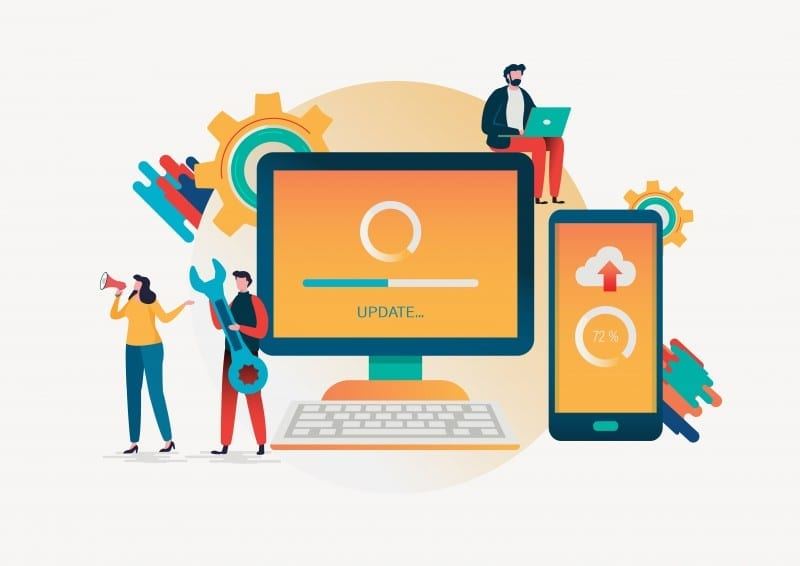
We often have clients who are startled when we tell them it’s time to update their WordPress website. “But we just did!” they exclaim. We recently had one surprised client who was ready to go off on their former developer because she thought they’d cheated her.
For all of you who have sites on WordPress, Joomla, Drupal, or any other site that requires updates, this blog post is for you. It’s important to know that, although there are endless various for configurations that depend on equally endless variations of needs, your website will need to be updated – but it goes beyond the CMS itself.
4 Tips To Remember About Website Updates
A CMS, or Content Management System, runs on a “stack” of programs and settings:
- Server – This is what you buy from your hosting company
- Code Stack – This is the list of coding languages used to run your CMS
- CMS – Your content management system itself
- Extensions – Pieces of code called “plugins” or “extensions” that extend the functionality of your CMS
Each one of these need to be updated, at least occasionally. Your hosting company should be taking care of the server, but everything from the code stack up is something you need to be aware of.
Here are a few things to keep in mind to have a healthy, secure website on a content management system:
Updates Are Frequent
The three mentioned above are extremely well known, with WordPress being the top running CMS for a number of years. In that number of years, there have been a huge number of updates, either for security reasons, technology changes, or product improvement. In other words, there isn’t just one update. They happen often.
There Are Several Types Of Updates
“Update my site” could mean a variety of things. Not to get too confusing, but there are security updates, minor updates and core updates, such as WordPress 5.0. It was a significant change to how WordPress operates.
As well, every time you have minor or core updates (and sometimes security), you’ll have plugins or extensions that need to be updated. This is in order to stay compatible with the newest version of the CMS.
You Need To Keep Your Site Updated
You can’t afford to not update your site – and the problem is less about technology and more about security. For example, WordPress is a very target-rich environment for hackers. Is it because WordPress is less secure than other CMS? Absolutely not. In fact, the WP developers have to stay on their toes to make sure their product is well protected.
However, WordPress is the most popular CMS out there, and hackers gotta hack. Between active site attacks and bots that go sniffing for vulnerabilities, it’s important to keep your site updated. WordPress works hard to make sure security holes are plugged when they’re found, but you have to do your part.
You May Not Be Up-To-Date… Even If You’ve Updated
What this means to you is that, just because your site has been updated doesn’t mean it’s up-to-date. -And here is the crux of this blog post.
WordPress, Joomla and Drupal – the top three CMS platforms – all have “push button” updates. “Your WordPress is out of date!” it declares, and proceeds to tell you to push the button to update (after backing up your database of course). “This plugin has an update available,” you’ll see, along with a button to update.
You can push the “update all” button, in fact, and watch everything turn green. Yes, you’ve done your duty and your site is updated. But probably not.
We’ve run into several clients of late with outdated PHP versions. PHP is a coding language that the top 3 use heavily. They’re running around with PHP 5.3 when it’s up to 7.3. This means that their site is insecure, even if they’ve been keeping their CMS version and extensions updated.
What Can You Do?
If you aren’t technically minded, don’t freak out. It’s okay. After reading this post, call your hosting provider. Ask them to run a check on your website looking for out-of-date software. Specifically, if you’re running on WordPress, Joomla or Drupal, ask them to make sure you’re running on the latest of Apache, MySQL and PHP.
If the answer is no, ask them if your website is compatible with the most recent versions. Depending on the answer, you may need to hire a developer.
We’ve seen several clients get that gut wrenching feeling when their site is attacked by hackers, broken by out-dated code or otherwise destroyed. It doesn’t have to happen to you. There are several ways you can protect your site, but the number one is: keep it updated.
What If You Don’t Know Diddly?
If you’re thinking, “Oh no! It’s too much to handle! I don’t know anything about this stuff,” don’t worry. Contact Level343; we have you covered. Make sure your site is updated and, if it’s not, that you have the experts on hand to get it that way.